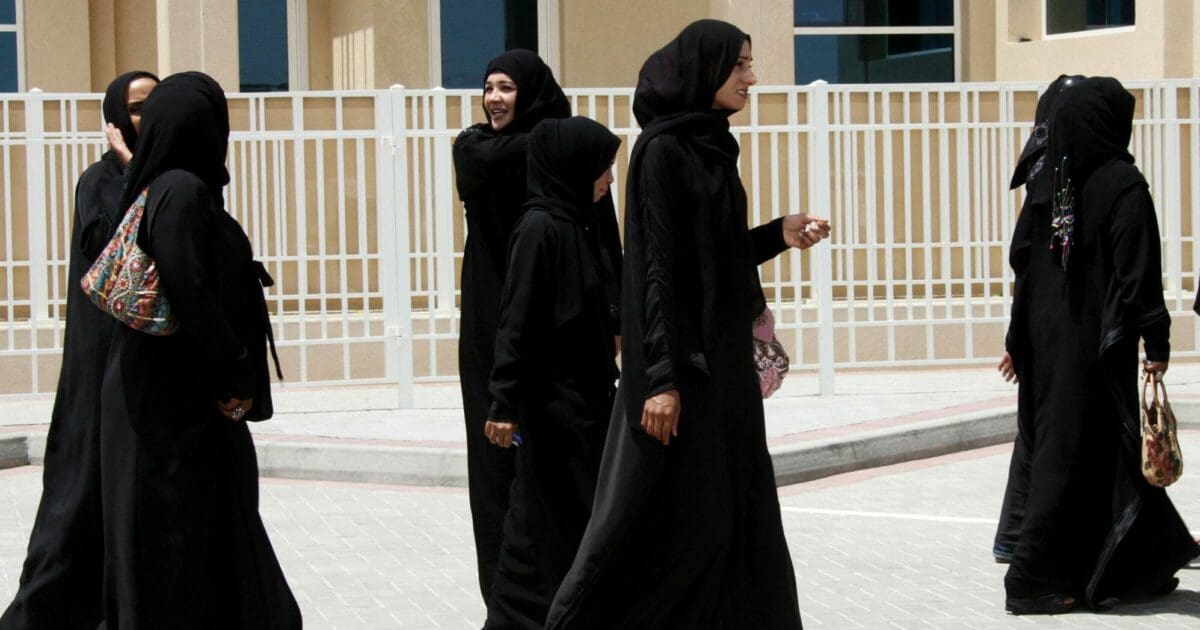In a recent announcement, French Education Minister Gabriel Attal made a significant declaration that has sparked outrage from Islamic supremacists: girls in French schools would no longer be permitted to wear Sharia-adherent abaya dresses. This decision, rooted in France’s commitment to secularism and its rules on religious symbols, has ignited a passionate debate about the special treatment and demands Muslims are putting on France and the nation’s laws of secularism,
French secularism, often referred to as “laïcité,” has a long history, dating back to the early 20th century when it was enshrined in the French Constitution. At its core, laïcité aims to maintain a strict separation between religion and state, ensuring that public institutions remain neutral in matters of faith. While this principle applies to all religious groups, the recent focus has revolved mainly around France’s Muslim population.
The abaya, a full-length outer garment worn by sharia-adherent Islamic women, undoubtedly carries religious connotations and visibly identifies its wearers as Muslim. This was seen as a violation of the 2004 law that banned schoolchildren from wearing “signs or outfits by which students ostensibly show a religious affiliation,” which included headscarves, turbans, large crosses, and kippas. However, many Muslims were trying to defy the ban and challenge the boundaries of secularism.
Education Minister Gabriel Attal defended the ban, stating, “When you walk into a classroom, you shouldn’t be able to identify the pupils’ religion just by looking at them.” He emphasized that the abaya was considered “a religious gesture” that tested the boundaries of the secular sanctuary that schools are meant to represent.
Given France’s secularism and its rules, the question arises: why do certain Muslim women seek ways to maneuver around these regulations? It’s essential to note that these rules aren’t singularly directed at Muslims; they apply impartially to adherents of all faiths, encompassing Christians and Jews. Nevertheless, the discourse surrounding this issue has been dominated by some members of the Muslim community, portraying it as a specific assault on their religious liberties, often invoking the term “Islamophobia” to underscore their claims. As they grapple with these new legal constraints, some Muslims are creatively navigating the landscape. Beyond raising concerns about potential discrimination, many assert that garments like the Abaya, traditionally associated with Islam, constitute a broader expression of modest attire, rather than being solely emblematic of religious identity.
The term “Islamophobia” was coined by Islamic terror-tied groups in the West in the 1990s to stigmatize and silence critics of Islamic doctrine and practice. It has been criticized as a propaganda tool to intimidate opposition to jihad terror. It has been proposed as an international crime by many Islamic and left-wing leaders and organizations.
While the ban on abayas has garnered support from the majority of French citizens, it has faced criticism from Islamic supremacists, Muslim leaders, and left-wing political figures who are advocating to destroy French culture. It’s essential to note that a large segment of the French population feels that their country’s culture and values are under constant due to increasing demands from some Islamic migrants. They express frustrations that Islamic communities are trying to impose their beliefs, culture, and laws on French society.
In this heated debate, the voices of ordinary citizens become critical in understanding the broader sentiment. Independent documentary maker Vincent Lapierre took to the streets to gauge public opinion on whether the abaya should be banned in schools. Their responses reflect the complex interplay of Islam and secularism in contemporary France.
As the nation awaits “clear rules at the national level” for the enforcement of this ban, the discussion surrounding religious symbols in French schools continues to evolve, raising essential questions about the nature of secularism and the effect of Islamic immigration on a non-Islamic country. The abaya ban not only symbolizes a challenge to secularism but also highlights the broader issues surrounding Islamic integration and religious identity in France.














Aside from challenging secularism, it clearly demonstrates islamos will not assimilate. They wish to conquer your civilization. Simply ban islamos, remove them, and get back to life. These invaders hate you, your culture, and way of life. You cannot have two parallel societies, where the subversive one undermines the rule of law!
ya got my vote!
It’s mind-boggling that the Left is supporting/enabling a movement that views outsiders (them!) as “infidels” and whose goal is to impose Sharia Law. Do they even know what Sharia Law is??
Let all the French children dress up as Crusaders —with big swords!
Remember when scary movies came on late at night on tv decades ago? All the devil-worshippers wore those black hooded robes. Sort of like these heathen. I don’t mean to be rude, simply disrespectful. GTFO, and go be a heathen idiot in your own country!
TELL THEM TO GO BACK HOME TO THEIR OWN COUNTRY OF BONDAGE. France is Not their home.
If they don’t like the country’s laws, they can always go back to the outhouse they came from.
Well, they could always move back to the desert if they don’t like France. I’m sure that the French would give them free transportation.
They simply like anywhere where they are given public handouts. Take that away and they’ll go somewhere else. There is no desire to assimilate. Women are covered up that way so that they “will not tempt men.”